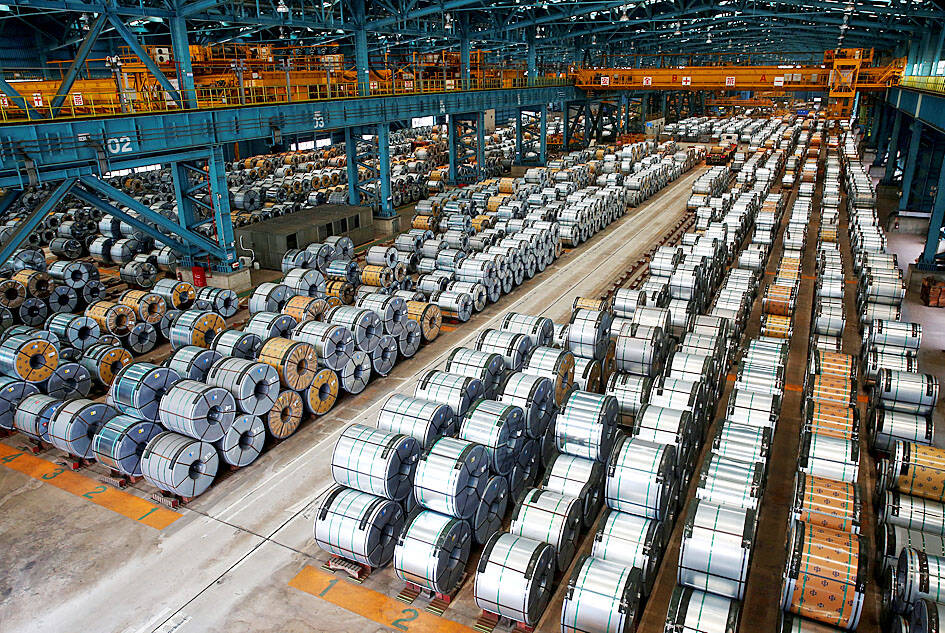China Steel Corp (中鋼) yesterday said it would raise domestic steel prices by up to NT$1,200 (US$39.59) per tonne for delivery next month, citing rising raw material costs and an upward trend in global markets.
The rising costs of iron ore and coking coal, along with robust post-COVID-19 pandemic demand in China, Europe and the US on the back of inventory replenishment, and Beijing tightening control on crude steel production, boosted market outlook for the second quarter, the nation’s only integrated steelmaker said in a statement.
China Steel said its price increases reflected price hikes by its international peers, including US-based Nucor Corp and Cleveland-Cliffs Inc, South Korea’s Hyundai Steel Co and China’s Baowu Steel Group Ltd (寶武鋼鐵).

Photo: Tyrone Siu, Reuters
China Steel’s price increases followed similar moves in December last year and last month. It at the time cited robust restocking demand for steel used in vehicles, home appliances and machinery.
The company’s latest adjustments are to increase prices of hot-rolled steel plates and hot-rolled carbon steel by NT$1,200 per tonne each, while the price of hot-rolled steel coils would rise by NT$900 per tonne, it said.
The price of cold-rolled steel coils would increase by NT$1,000 per tonne, the company said.
Prices of hot-dipped, zinc-galvanized steel coils used in construction and enameled steel would rise by NT$1,000 per tonne, while those used in home appliances and computers would increase by NT$600 per tonne, it said.
The price of electrical sheets would rise by NT$600 per tonne, it added.
Last week, the company reported that consolidated revenue last month decreased 15.26 percent month-on-month and dropped 34.43 percent year-on-year to NT$26.24 billion, saying it was due to the Lunar New Year holiday resulting in fewer working days in the month.
The company said revenue outlook for this quarter remains promising in light of robust inventory replenishment from customers and an uptrend in global steel prices.
The company said it expects market momentum to remain solid through next quarter, a traditional high season for the industry, citing a gradual recovery in the global economy and reconstruction demand after a devastating earthquake struck Turkey and Syria last week.
For the whole of last year, the steelmaker’s pretax profit reached NT$23.26 billion, down 72 percent from 2021, as revenue fell 4.01 percent to NT$449.57 billion, data released on Jan. 31 showed.

In Italy’s storied gold-making hubs, jewelers are reworking their designs to trim gold content as they race to blunt the effect of record prices and appeal to shoppers watching their budgets. Gold prices hit a record high on Thursday, surging near US$5,600 an ounce, more than double a year ago as geopolitical concerns and jitters over trade pushed investors toward the safe-haven asset. The rally is putting undue pressure on small artisans as they face mounting demands from customers, including international brands, to produce cheaper items, from signature pieces to wedding rings, according to interviews with four independent jewelers in Italy’s main

Macronix International Co (旺宏), the world’s biggest NOR flash memory supplier, yesterday said it would spend NT$22 billion (US$699.1 million) on capacity expansion this year to increase its production of mid-to-low-density memory chips as the world’s major memorychip suppliers are phasing out the market. The company said its planned capital expenditures are about 11 times higher than the NT$1.8 billion it spent on new facilities and equipment last year. A majority of this year’s outlay would be allocated to step up capacity of multi-level cell (MLC) NAND flash memory chips, which are used in embedded multimedia cards (eMMC), a managed

Japanese Prime Minister Sanae Takaichi has talked up the benefits of a weaker yen in a campaign speech, adopting a tone at odds with her finance ministry, which has refused to rule out any options to counter excessive foreign exchange volatility. Takaichi later softened her stance, saying she did not have a preference for the yen’s direction. “People say the weak yen is bad right now, but for export industries, it’s a major opportunity,” Takaichi said on Saturday at a rally for Liberal Democratic Party candidate Daishiro Yamagiwa in Kanagawa Prefecture ahead of a snap election on Sunday. “Whether it’s selling food or

In the wake of strong global demand for AI applications, Taiwan’s export-oriented economy accelerated with the composite index of economic indicators flashing the first “red” light in December for one year, indicating the economy is in booming mode, the National Development Council (NDC) said yesterday. Moreover, the index of leading indicators, which gauges the potential state of the economy over the next six months, also moved higher in December amid growing optimism over the outlook, the NDC said. In December, the index of economic indicators rose one point from a month earlier to 38, at the lower end of the “red” light.